

Why do they come? The Library as place and brand – The Library Lab. You probably all know the scene: A library reading hall with endless rows of students working, studying, learning.
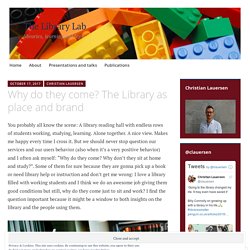
Alone together. A nice view. Is a library without books still a library? Some thoughts on The Library as space. Text of my talk at The Danish Research Library Associations Winter Assembly 2017, Korsoer, Denmark.
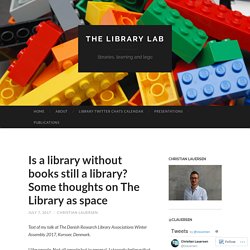
I like people. Not all people but in general. I strongly believe that people talking to each other, sharing ideas, challenging one another on believes and arguments makes this world a better place. Principals Perceptions of School Librarians. Understanding extra-role behavior in schools: the relationships between job satisfaction, sense of efficacy, and teachers’ extra-role behavior - ScienceDirect.
<div pearltreesdevid="PTD137" role="alert" class="alert-message-container"><div pearltreesdevid="PTD138" aria-hidden="true" class="alert-message-body"><span pearltreesdevid="PTD139" style="display: inline-block;" class="Icon IconAlert"><svg pearltreesDevId="PTD140" style="width: 100%; height: 100%;" width="24" height="24" focusable="false" tabindex="-1" fill="currentColor"><path pearltreesDevId="PTD141" fill="#f80" d="M11.84 4.63c-.77.05-1.42.6-1.74 1.27-1.95 3.38-3.9 6.75-5.85 10.13-.48.83-.24 1.99.53 2.56.7.6 1.66.36 2.5.41 3.63 0 7.27.01 10.9-.01 1.13-.07 2.04-1.28 1.76-2.39-.1-.58-.56-1.02-.81-1.55-1.85-3.21-3.69-6.43-5.55-9.64-.42-.52-1.06-.83-1.74-.79z"></path><path pearltreesDevId="PTD142" d="M11 8h2v5h-2zM11 14h2v2h-2z"></path></svg></span><!
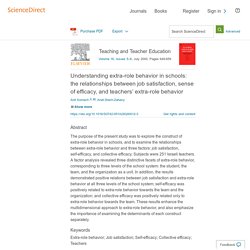
-- react-text: 55 -->JavaScript is disabled on your browser. Please enable JavaScript to use all the features on this page. <! -- /react-text --></div></div> Abstract. Page_error. A Framework for the Education of the Information Professions in Australia: The Australian Library Journal: Vol 61, No 2. Personalizing professionalism: The professional identity experiences of LIS graduates in non-library rolesJournal of Librarianship and Information Science - Melissa Fraser-Arnott, 2017.
‘So what made you decide to become a school librarian?’ Reasons people currently working in New Zealand school libraries give for their choice of employmentJournal of Librarianship and Information Science - Lynn Walker, Philip Calvert, 2016. Library of the future: 8 technologies we would love to see. Libraries lead the way to digital citizenship.
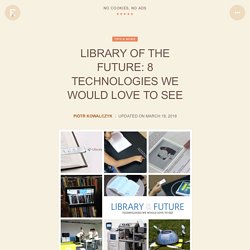
They should be the first places where most advanced technologies are implemented. Today, libraries are not only about lending books. They are creative spaces, not only for individuals, but also teams. They are economic incubators and learning hubs. Most of all, the libraries are the entry points to the digital world. Therefore, to improve technological literacy of local communities, libraries should be equipped with relevant technologies. High School Flexible Seating Done Right. Teacher Stephanie Sleeper was intrigued by a photo of a flexible high school classroom, but she needed to know more.
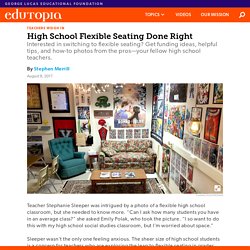
“Can I ask how many students you have in an average class? " she asked Emily Polak, who took the picture. “I so want to do this with my high school social studies classroom, but I’m worried about space.” Sleeper wasn't the only one feeling anxious. The sheer size of high school students is a concern for teachers who are exploring the leap to flexible seating in grades nine through twelve. And the questions didn’t stop there when we asked high school educators for their thoughts on flexible seating. ExpectMoreOpen. NAPLAN Results and the Role of the School Library and Teacher Librarian. I don’t agree with standardized testing such as NAPLAN, but at this point there is no avoiding it, so I will at least use the data to shine a light on an issue I am passionate about – the role of the teacher librarian.
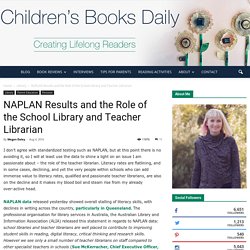
Literacy rates are flatlining, and in some cases, declining, and yet the very people within schools who can add immense value to literacy rates, qualified and passionate teacher librarians, are also on the decline and it makes my blood boil and steam rise from my already over-active head. NAPLAN data released yesterday showed overall stalling of literacy skills, with declines in writing across the country, particularly in Queensland. The professional organisation for library services in Australia, the Australian Library and Information Association (ALIA) released this statement in regards to NAPLAN data: school libraries and teacher librarians are well placed to contribute to improving student skills in reading, digital literacy, critical thinking and research skills.
Michael Bierut: How to design a library that makes kids want to read. A Challenge to Library Managers: Embed Creativity in Your library. Recently I read Sally Turbitt’s Glam Blog Club post where she reveals her frustration as a new Library Graduate at the slowness of the library profession to change, adapt or allow creative practice at all.
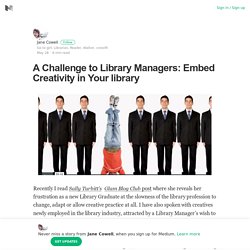
I have also spoken with creatives newly employed in the library industry, attracted by a Library Manager’s wish to broaden the library skill base, but finding the dogged unwillingness to change anything that Sally speaks about to be entrenched and that all their ideas are rejected. They also speak about the meanness of our profession as long term staff members, often now middle managers, allow their own feelings of not being nurtured as a professional to affect their management practice of their team members. So how do we as Library Managers address this issue within our libraries? It is obviously not enough to employ new staff with new ways of thinking and new skills if we do not nurture them and allow creative practice. 2. 3. 4. The Five Stages Of Tech Disruption - Disruption.
Library Directors and Discovery: A Changing Perspective? As research and teaching practices evolve in the context of substantial environmental change within higher education, the ways in which scholars discover resources for these practices have shifted.
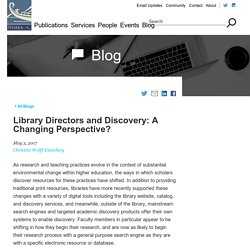
In addition to providing traditional print resources, libraries have more recently supported these changes with a variety of digital tools including the library website, catalog, and discovery services, and meanwhile, outside of the library, mainstream search engines and targeted academic discovery products offer their own systems to enable discovery. Faculty members in particular appear to be shifting in how they begin their research, and are now as likely to begin their research process with a general purpose search engine as they are with a specific electronic resource or database. Last month, Ithaka S+R published results from the US Library Survey 2016, which examines strategy and leadership issues from the perspective of academic library deans and directors. BYOD changing the face of campus computer labs. Dive Brief: The rise in virtualization technology and students bringing their own devices has necessitated a shift in how colleges and universities think about computer labs, according to Ed Tech: Focus on Higher Education.While modernization efforts have focused on creating collaborative, open and flexible workspaces with resources like connected large-screen TVs for group work or PCs with specialty software like analytics software or the Adobe Creative Suite, IT managers have also kept in mind that traditional lab resources are still needed for students who can't afford their own devices.The boost in BYOD and even outsourced printer services has made it possible for many institutions to refocus IT investments in areas like improving device loaner programs, specialty software and virtual desktop availability, and lab space redesigns.
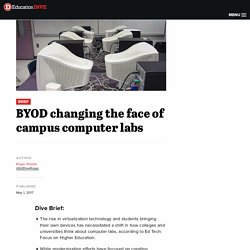
Dive Insight: Computer labs aren't the only locations on campus facing changes amid modern technological trends. New 12 point library checklist for principals – 2017. The brilliant Doug Johnson . . .
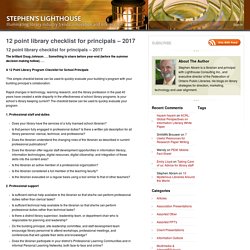
Something to share before year-end (before the summer decision making hollow) . . . A 12 Point Library Program Checklist for School Principals “The simple checklist below can be used to quickly evaluate your building’s program with your building principal’s collaboration. Rapid changes in technology, learning research, and the library profession in the past 40 years have created a wide disparity in the effectiveness of school library programs. The Digital Wild West of Apps Is an Opportunity for Librarians. The Joan Ganz Cooney Center at Sesame Workshop and New America has surveyed the language and literacy apps targeted to children, preschool to age eight, and available through the Apple, Google Play, and Amazon app stores. The resulting study, “Getting a Read on the App Stores: A Market Scan and Analysis of Literacy Apps,” analyzed the descriptions of the apps as well as their content.
The report’s findings include: The choice of apps for preschool age children is truly vast. Anyone trying to choose within this particular category faces a “digital wild west.” Jessica Ralli, early literacy programs coordinator at Brooklyn (NY) Public Library, agrees. Torching the Modern-Day Library of Alexandria - The Atlantic. You were going to get one-click access to the full text of nearly every book that’s ever been published. Books still in print you’d have to pay for, but everything else—a collection slated to grow larger than the holdings at the Library of Congress, Harvard, the University of Michigan, at any of the great national libraries of Europe—would have been available for free at terminals that were going to be placed in every local library that wanted one. At the terminal you were going to be able to search tens of millions of books and read every page of any book you found.
You’d be able to highlight passages and make annotations and share them; for the first time, you’d be able to pinpoint an idea somewhere inside the vastness of the printed record, and send somebody straight to it with a link. Books would become as instantly available, searchable, copy-pasteable—as alive in the digital world—as web pages. It was to be the realization of a long-held dream. They had good reason to. Successful Library Design Attitudes. In previous Learning Landscapes articles (Whisken, 2011 - 2015b) I have explored the research and decisions being applied in the digital and physical landscapes of school libraries as they evolve, with particular application to my own situation, Carey Baptist Grammar School, where a new library is the hub of a $30m Centre for Learning and Innovation. The guiding question has been: What are the forms (space designs and arrangements) that best suit the functions (particular types of learning with information, wide reading and study) to take place in the school library?
It brings together two key influences: Lyn Hays’ iCentre themes (2011a, 2011b, 2012) and Christine Bruce’s Informed Learning (2008). The question is used again in this article as the umbrella for examination of successful attitudes brought to the design process for new or remodelled library spaces in a variety of fields. . . . libraries are increasingly seen by their communities as places for other functions. Don't teach your kids coding, teach them how to live online.
"Don't teach your kids coding," says New York Times journalist Thomas Friedman. "Well – teach it if you want. But before you teach them coding, teach them digital civics: how to talk to one another on the internet, how to understand fact from fiction. " The internet is a sewer "of untreated, unfiltered information," he told his audience of teachers and international education leaders at a conference in Dubai on the weekend, "and if we don't build the values filters so our children can interact in this environment, with real values ... we have a real problem.
" Who should teach our kids the difference between real and fake news? Our librarians: Debra E. Kachel. By Debra E. Kachel In a post truth era where emotional appeals and unsubstantiated claims sway popular opinions over factual information, who teaches our K-12 students how to interpret the multitude of media messages that daily bombard them? Debra Kachel (submitted photo) How do students learn to separate the valuable from the worthless to make good decisions and form valid opinions.
A recent Stanford University study found that most middle school students couldn't distinguish between an advertisement and a news story on the Internet. The Librarian as an Instructional Partner – Inspired Ideas – Medium. When I first saw the Alliance for Excellent Education’s Future Ready Librarians Framework, I was excited to note the inclusion of “Collaborative Leadership” and “Builds Instructional Partnerships” as descriptors of an excellent school librarian. These are two areas of the job that I enjoy the most, so their inclusion only seemed natural to me.
Engaging students in wide reading. November 24, 2012. School Libraries 21st Century. 4 18. Creating a Conversational Library Search Experience – Designing Better Libraries. In Defense of Discovery Tools. AASL infographic. Education Week. Majority of Americans are still reading print books. 5 Benefits of Digital Reading Devices for Boys. Physical Book Sales Rocket As Digital Dips.
Physical book sales have rocketed by four million this year, fighting back against the digital revolution. Predictions, a few years ago, that the printed book would die appear to have been greatly exaggerated. Last year saw the first rise in sales since 2007, while digital book sales dropped for the first time since 2011.
Betsy Tobin, who runs the independent bookshop Ink@84 in Highbury, London, offers her customers a personalised service. The bookshop offers coffee and alcohol and runs events and special author evenings. The Educational Buzzword Dilemma: Why “Innovation” is about to Jump the Shark. The Educational Buzzword Dilemma: Why “Innovation” is about to Jump the Shark. 5 Library Trends to Watch in 2016. Libraries everywhere continue to meet the challenge of evolving as their users’ needs change. Future Ready Librarians - Future Ready Schools.
BIALL 2016 - Developing an alternative toolset for driving change in library services. 7 Gorgeous New Libraries That Aren't Just About Books. School Libraries of the Future: 5 Trends to Watch. We Need Libraries As Much As Maker Spaces – John Spencer. School Libraries and Makerspaces: Can They Coexist? How Libraries Fit in the Future of Learning. School libraries face a bleak future as leaders try to balance the books. What Does the Next-Generation School Library Look Like? The once and future library. Education Week. Whatever Is Accessible, Gets Utilized. YA fiction is about far more than political correctness. Information Specialists’ Biggest Blunder with Paid Content. The new librarian: leaders in the digital age. How A School Library Increased Student Use By 1,000 Percent.
A Library AND a Makerspace. How Libraries Are Becoming Modern Makerspaces. School Library Guidelines, 2nd edition. What will libraries be like in 2100? To Inspire Learning, Architects Reimagine Learning Spaces. A Developmental View of Information Literacy. What libraries should look like in the future. Are we making libraries for people or libraries for books? Sunday librarianship defining the role of the librarian in the ibschool. Evaluating digital services: a visitors and residents approach. Educational Technology and Mobile Learning: A Step by Step Guide On Everything Teachers Need to Know about Google Keep. School Libraries Matter: The Changing Role of the School Librarian. What To Expect From Libraries in the 21st Century: Pam Sandlian Smith at TEDxMileHigh. Beyond the Bullet Points: It is Time to Stop Trying to Save Libraries.
Social media and your library. What Education Technology Could Look Like Over the Next Five Years. Focused curation - an indispensable role for the school librarian. Eli Pariser: Beware online "filter bubbles". The future of the school library catalogue. 2015 Library Edition. “There and Back Again”: Reimagining the Public Library for the Twenty-First Century. The Librarian Who Doesn't Say Shhh! - Opening books to open minds. Technology, libraries, and schools. The MHMS Daring School Library Blog.
From the desk of a cataloguer. The Future of Library Services for and with Teens. 5 things Google Scholar does better than your library discovery service. How are discovery systems similar to Google? How are they different? Library Grits: ATL Skills audit. Turnitin faces new questions about efficacy of plagiarism detection software. 8 Characteristics of the Innovative Leader. BIBLIA: Game Based Learning at Curtin University - Guest Post by Karen Miller. Ala-environment. Makerspaces, Participatory Learning, and Libraries.
4 Tips to Transform Your Learning Space. October 14 Libraries in the age of plenty - Google Docs. Live Training – Search Education – Google. Beyond the Bullet Points: It is Time to Stop Trying to Save Libraries. School Libraries Matter: The Changing Role of the School Librarian. 30 Trends In Education Technology For 2015.